Deck 9: Substitution and Elimination Reactions of Alkyl Halides
Question
Question
Question
Question
Question
Question
Question
Question
Question
Question
Question
Question
Question
Question
Question
Question
Question
Question
Question
Question
Question
Question
Question
Question
Question
Question
Question
Question
Question
Question
Question
Question
Question
Question
Question
Question
Question
Question
Question
Question
Question
Question
Question
Question
Question
Question
Question
Question
Question
Question
Question
Question
Question
Question
Question
Question
Question
Question
Question
Question
Question
Question
Question
Question
Question
Question
Question
Question
Question
Question
Question
Question
Question
Question
Question
Question
Question
Question
Question
Question

Unlock Deck
Sign up to unlock the cards in this deck!
Unlock Deck
Unlock Deck
1/228
Play
Full screen (f)
Deck 9: Substitution and Elimination Reactions of Alkyl Halides
1
Assuming no other changes,what is the effect of doubling both the alkyl halide and the nucleophile concentrations in the above reaction?
A)no change
B)doubles the rate
C)triples the rate
D)quadruples the rate
E)rate is halved
A)no change
B)doubles the rate
C)triples the rate
D)quadruples the rate
E)rate is halved
quadruples the rate
2
Which of the following best describes the carbon-chlorine bond of an alkyl chloride?
A)nonpolar; no dipole
B)polar; δ+ at carbon and δ- at chlorine
C)polar; δ- at carbon and δ+ at chlorine
D)ionic
E)none of the above
A)nonpolar; no dipole
B)polar; δ+ at carbon and δ- at chlorine
C)polar; δ- at carbon and δ+ at chlorine
D)ionic
E)none of the above
polar; δ+ at carbon and δ- at chlorine
3
Identify the strongest nucleophile in an SN2 reaction.
A)isopropoxide ion
B)tert-butoxide ion
C)ethoxide ion
D)tert-pentoxide ion
A)isopropoxide ion
B)tert-butoxide ion
C)ethoxide ion
D)tert-pentoxide ion
ethoxide ion
4
Which of the following is not normally considered to be a nucleophile?
A)NH3
B)NH2CH3
C)HC C:-
C:-
D)CH3CH2+
A)NH3
B)NH2CH3
C)HC
 C:-
C:-D)CH3CH2+

Unlock Deck
Unlock for access to all 228 flashcards in this deck.
Unlock Deck
k this deck
5
What is the nucleophile in the reaction shown below? 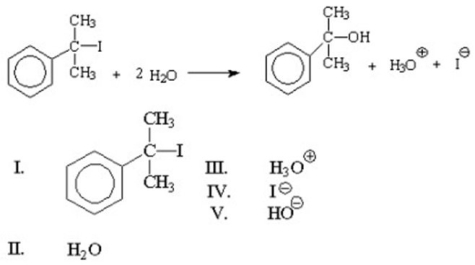
A)I
B)II
C)III
D)IV
E)V

A)I
B)II
C)III
D)IV
E)V

Unlock Deck
Unlock for access to all 228 flashcards in this deck.
Unlock Deck
k this deck
6
Which of the following alkyl halides gives the slowest SN2 reaction?
A)CH3CH2Cl
B)
C)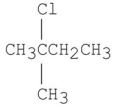
D)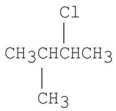
E)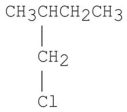
A)CH3CH2Cl
B)

C)

D)

E)


Unlock Deck
Unlock for access to all 228 flashcards in this deck.
Unlock Deck
k this deck
7
Give the mechanism including the transition state. 


Unlock Deck
Unlock for access to all 228 flashcards in this deck.
Unlock Deck
k this deck
8
Assuming no other changes,what is the effect of doubling only the concentration of the alkyl halide in the above SN2 reaction?
A)no change
B)doubles the rate
C)triples the rate
D)quadruples the rate
E)rate is halved
A)no change
B)doubles the rate
C)triples the rate
D)quadruples the rate
E)rate is halved

Unlock Deck
Unlock for access to all 228 flashcards in this deck.
Unlock Deck
k this deck
9
Identify the alkyl halide that reacts the fastest in a SN2 reaction.
A)2-chloro-2-methylpropane
B)2-chlorobutane
C)1-chlorobutane
D)chloromethane
A)2-chloro-2-methylpropane
B)2-chlorobutane
C)1-chlorobutane
D)chloromethane

Unlock Deck
Unlock for access to all 228 flashcards in this deck.
Unlock Deck
k this deck
10
Which of the following SN2 reactions is the fastest?
A)CH3CH2CH2CH2Br + OH- → CH3CH2CH2CH2OH + Br-
B)CH3CH2CH2CH2Br + H2O → CH3CH2CH2CH2OH + HBr
C)CH3CH2CHBrCH3 + OH- → CH3CH2CHOHCH3 + Br-
D)CH3CH2CHBrCH3 + H2O → CH3CH2CHOHCH3 + HBr
A)CH3CH2CH2CH2Br + OH- → CH3CH2CH2CH2OH + Br-
B)CH3CH2CH2CH2Br + H2O → CH3CH2CH2CH2OH + HBr
C)CH3CH2CHBrCH3 + OH- → CH3CH2CHOHCH3 + Br-
D)CH3CH2CHBrCH3 + H2O → CH3CH2CHOHCH3 + HBr

Unlock Deck
Unlock for access to all 228 flashcards in this deck.
Unlock Deck
k this deck
11
Which of the following SN2 reactions is the slowest?
A)CH3CH2CH3Br + HO- → CH3CH2CH3OH + Br-
B)CH3CH2CH2Cl + HO- → CH3CH2CH2OH + Cl-
C)CH3CH2CH2I + HO- → CH3CH2CH2OH + I-
D)CH3CH2CH3F + HO- → CH3CH2CH2OH + F-
E)
A)CH3CH2CH3Br + HO- → CH3CH2CH3OH + Br-
B)CH3CH2CH2Cl + HO- → CH3CH2CH2OH + Cl-
C)CH3CH2CH2I + HO- → CH3CH2CH2OH + I-
D)CH3CH2CH3F + HO- → CH3CH2CH2OH + F-
E)


Unlock Deck
Unlock for access to all 228 flashcards in this deck.
Unlock Deck
k this deck
12
Identify the alkyl halide that reacts the fastest in an SN2 reaction.
A)1-chloropropane
B)1-bromopropane
C)1-fluoropropane
D)1-iodopropane
A)1-chloropropane
B)1-bromopropane
C)1-fluoropropane
D)1-iodopropane

Unlock Deck
Unlock for access to all 228 flashcards in this deck.
Unlock Deck
k this deck
13
Which of the following SN2 reactions is the fastest?
A)
B)CH3CH2CH2I + HO- → CH3CH2CH2OH + I-
C)
D)CH3CH2CH3Br + HO- → CH3CH2CH3OH + Br-
E)CH3CH2CH2I + H2O → CH3CH2CH2OH + HI
A)

B)CH3CH2CH2I + HO- → CH3CH2CH2OH + I-
C)

D)CH3CH2CH3Br + HO- → CH3CH2CH3OH + Br-
E)CH3CH2CH2I + H2O → CH3CH2CH2OH + HI

Unlock Deck
Unlock for access to all 228 flashcards in this deck.
Unlock Deck
k this deck
14
Which of the following is not a nucleophile?
A)CH3NH2
B)PH3
C)(+CH3)
D)
E)
A)CH3NH2
B)PH3
C)(+CH3)
D)

E)


Unlock Deck
Unlock for access to all 228 flashcards in this deck.
Unlock Deck
k this deck
15
Which of the following compounds will undergo an SN2 reaction most readily?
A)(CH3)3CCH2I
B)(CH3)3CCl
C)(CH3)2CHI
D)(CH3)2CHCH2CH2CH2Cl
E)(CH3)2CHCH2CH2CH2I
A)(CH3)3CCH2I
B)(CH3)3CCl
C)(CH3)2CHI
D)(CH3)2CHCH2CH2CH2Cl
E)(CH3)2CHCH2CH2CH2I

Unlock Deck
Unlock for access to all 228 flashcards in this deck.
Unlock Deck
k this deck
16
Which of the following is a secondary alkyl halide?
A)CH3Br
B)(CH3)3CBr
C)(CH3)2CHBr
D)(CH3)2CHCH2Br
A)CH3Br
B)(CH3)3CBr
C)(CH3)2CHBr
D)(CH3)2CHCH2Br

Unlock Deck
Unlock for access to all 228 flashcards in this deck.
Unlock Deck
k this deck
17
Which of the following does not provide evidence that there are two different mechanisms for nucleophilic substitution?
A)reaction products when CH3I is used as the substrate
B)reaction products when (CH3)3CCH2I is used as substrate
C)the stereochemistry of nucleophilic substitutions
D)the effect of nucleophile concentration on rate
A)reaction products when CH3I is used as the substrate
B)reaction products when (CH3)3CCH2I is used as substrate
C)the stereochemistry of nucleophilic substitutions
D)the effect of nucleophile concentration on rate

Unlock Deck
Unlock for access to all 228 flashcards in this deck.
Unlock Deck
k this deck
18
Give the mechanism including the transition state. 


Unlock Deck
Unlock for access to all 228 flashcards in this deck.
Unlock Deck
k this deck
19
Which of the following SN2 reactions is the slowest?
A)CH3CH2CHBrCH3 + OH- → CH3CH2CHOHCH3 + Br-
B)CH3CH2CHBrCH3 + H2O → CH3CH2CHOHCH3 + HBr
C)CH3CH2CH2CH2Br + OH- → CH3CH2CH2CH2OH + Br-
D)CH3CH2CH2CH2Br + H2O → CH3CH2CH2CH2OH + HBr
A)CH3CH2CHBrCH3 + OH- → CH3CH2CHOHCH3 + Br-
B)CH3CH2CHBrCH3 + H2O → CH3CH2CHOHCH3 + HBr
C)CH3CH2CH2CH2Br + OH- → CH3CH2CH2CH2OH + Br-
D)CH3CH2CH2CH2Br + H2O → CH3CH2CH2CH2OH + HBr

Unlock Deck
Unlock for access to all 228 flashcards in this deck.
Unlock Deck
k this deck
20
Which of the following are the substitution products of the reaction shown below? CH3CH2Br + -OH → ?
A)CH3CH2BrH+ + O-
B)HOCH2CH2Br
C)CH3CH2OH + Br-
D)CH2 CH2 + Br- + H2O
CH2 + Br- + H2O
E)CH2 CHBr + H2O
CHBr + H2O
A)CH3CH2BrH+ + O-
B)HOCH2CH2Br
C)CH3CH2OH + Br-
D)CH2
 CH2 + Br- + H2O
CH2 + Br- + H2OE)CH2
 CHBr + H2O
CHBr + H2O
Unlock Deck
Unlock for access to all 228 flashcards in this deck.
Unlock Deck
k this deck
21
Provide the structure of the major organic product of the following reaction. 


Unlock Deck
Unlock for access to all 228 flashcards in this deck.
Unlock Deck
k this deck
22
Which of the following species is the least nucleophilic?
A)(CH3)3CO-
B)H2O
C)(CH3)3N
D)BF3
E)CN-
A)(CH3)3CO-
B)H2O
C)(CH3)3N
D)BF3
E)CN-

Unlock Deck
Unlock for access to all 228 flashcards in this deck.
Unlock Deck
k this deck
23
Which of the following species is most reactive in an SN2 reaction?
A)CH3CH2-Cl
B)CH3CH2-Br
C)CH3CH2-I
D)CH3CH2-F
E)CH3CH2-OH
A)CH3CH2-Cl
B)CH3CH2-Br
C)CH3CH2-I
D)CH3CH2-F
E)CH3CH2-OH

Unlock Deck
Unlock for access to all 228 flashcards in this deck.
Unlock Deck
k this deck
24
Provide the major organic product(s)in the reaction below. 


Unlock Deck
Unlock for access to all 228 flashcards in this deck.
Unlock Deck
k this deck
25
Which of the following is the strongest nucleophile in an aqueous solution?
A)HO-
B)F-
C)Cl-
D)Br-
E)I-
A)HO-
B)F-
C)Cl-
D)Br-
E)I-

Unlock Deck
Unlock for access to all 228 flashcards in this deck.
Unlock Deck
k this deck
26
Provide the structure of the major organic product of the following reaction. 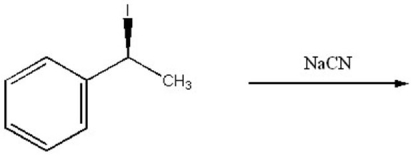


Unlock Deck
Unlock for access to all 228 flashcards in this deck.
Unlock Deck
k this deck
27
Which of the following statements concerning SN2 reactions of alkyl halides is not correct?
A)The rate of reaction depends on the concentration of the nucleophile.
B)The rate of reaction depends on the concentration of the alkyl halide.
C)The rate of reaction of a particular alkyl bromide depends on the steric accessibility of the carbon of the C-Br bond.
D)All alkyl iodides react more rapidly than all alkyl chlorides.
E)The rate of reaction depends on the relative nucleophilicity of the nucleophile.
A)The rate of reaction depends on the concentration of the nucleophile.
B)The rate of reaction depends on the concentration of the alkyl halide.
C)The rate of reaction of a particular alkyl bromide depends on the steric accessibility of the carbon of the C-Br bond.
D)All alkyl iodides react more rapidly than all alkyl chlorides.
E)The rate of reaction depends on the relative nucleophilicity of the nucleophile.

Unlock Deck
Unlock for access to all 228 flashcards in this deck.
Unlock Deck
k this deck
28
Draw and describe the transition state in the SN2 reaction between CH3I and CH3CH2O-Na+.

Unlock Deck
Unlock for access to all 228 flashcards in this deck.
Unlock Deck
k this deck
29
Which of the following is the best leaving group?
A)HO-
B)F-
C)Cl-
D)Br-
E)I-
A)HO-
B)F-
C)Cl-
D)Br-
E)I-

Unlock Deck
Unlock for access to all 228 flashcards in this deck.
Unlock Deck
k this deck
30
In an SN2 reaction why does the nucleophile attack the carbon on the side opposite the leaving group?

Unlock Deck
Unlock for access to all 228 flashcards in this deck.
Unlock Deck
k this deck
31
Provide the structure of the major organic product of the following reaction. 


Unlock Deck
Unlock for access to all 228 flashcards in this deck.
Unlock Deck
k this deck
32
What product results from the SN2 reaction between (R)-2-chloropentane and hydroxide?
A)(R)-2-pentanol
B)(S)-2-pentanol
C)racemic pentanol
D)1-pentanol
E)3-pentanol
A)(R)-2-pentanol
B)(S)-2-pentanol
C)racemic pentanol
D)1-pentanol
E)3-pentanol

Unlock Deck
Unlock for access to all 228 flashcards in this deck.
Unlock Deck
k this deck
33
Provide the structure of the major organic product in the following reaction.
(CH3)3N + CH3CH2CH2I →
(CH3)3N + CH3CH2CH2I →

Unlock Deck
Unlock for access to all 228 flashcards in this deck.
Unlock Deck
k this deck
34
Provide the structure of the major organic product which results when (S)-2-iodopentane is treated with KCN in DMF.

Unlock Deck
Unlock for access to all 228 flashcards in this deck.
Unlock Deck
k this deck
35
Provide the major organic product(s)in the reaction below. 


Unlock Deck
Unlock for access to all 228 flashcards in this deck.
Unlock Deck
k this deck
36
Provide a detailed,stepwise mechanism for the reaction below.
(CH3)2CHCH2CH2CH2I + CN- → (CH3)2CHCH2CH2CH2CN + I-
(CH3)2CHCH2CH2CH2I + CN- → (CH3)2CHCH2CH2CH2CN + I-

Unlock Deck
Unlock for access to all 228 flashcards in this deck.
Unlock Deck
k this deck
37
Do all primary alkyl iodides undergo SN2 reactions with sodium cyanide in DMSO at identical rates? Explain.

Unlock Deck
Unlock for access to all 228 flashcards in this deck.
Unlock Deck
k this deck
38
Provide the structure of the major organic product in the following reaction. 


Unlock Deck
Unlock for access to all 228 flashcards in this deck.
Unlock Deck
k this deck
39
Provide the major organic product(s)in the reaction below. 


Unlock Deck
Unlock for access to all 228 flashcards in this deck.
Unlock Deck
k this deck
40
Which of the following is the best nucleophile in water?
A)I-
B)CH3SCH3
C)CH3OCH3
D)Cl-
A)I-
B)CH3SCH3
C)CH3OCH3
D)Cl-

Unlock Deck
Unlock for access to all 228 flashcards in this deck.
Unlock Deck
k this deck
41
A student attempted to prepare 1-chlorobutane by treating 1-butanol with NaCl in acetone.Was the student successful? Explain.

Unlock Deck
Unlock for access to all 228 flashcards in this deck.
Unlock Deck
k this deck
42
Provide the major organic product(s)of the reaction shown. 


Unlock Deck
Unlock for access to all 228 flashcards in this deck.
Unlock Deck
k this deck
43
Which of the following bromides reacts readily via an SN2 reaction with NaN3?
A)C6H5Br
B)CH3CH2CH=CHBr
C)(C6H5)3CBr
D)(CH3)3CCH2CH2CH2Br
E)1-bromo-1-methylcyclohexane
A)C6H5Br
B)CH3CH2CH=CHBr
C)(C6H5)3CBr
D)(CH3)3CCH2CH2CH2Br
E)1-bromo-1-methylcyclohexane

Unlock Deck
Unlock for access to all 228 flashcards in this deck.
Unlock Deck
k this deck
44
In each of the pairs below,which is the best nucleophile in alcoholic solvents?
a.CH3S- or CH3O-
b.(CH3)2NH or (CH3)3N
c.Cl- or F-
d.SCN- or OCN-
a.CH3S- or CH3O-
b.(CH3)2NH or (CH3)3N
c.Cl- or F-
d.SCN- or OCN-

Unlock Deck
Unlock for access to all 228 flashcards in this deck.
Unlock Deck
k this deck
45
Give the mechanism. 


Unlock Deck
Unlock for access to all 228 flashcards in this deck.
Unlock Deck
k this deck
46
Provide the major organic product(s)of the reaction shown. 


Unlock Deck
Unlock for access to all 228 flashcards in this deck.
Unlock Deck
k this deck
47
Which halide reacts most rapidly via an SN2 mechanism?
A)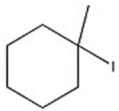
B)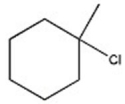
C)
D)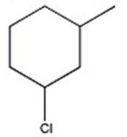
E)
A)

B)

C)

D)

E)


Unlock Deck
Unlock for access to all 228 flashcards in this deck.
Unlock Deck
k this deck
48
Identify the alkyl halide that reacts the fastest in an SN1 reaction.
A)2-chloropropane
B)2-bromopropane
C)2-fluoropropane
D)2-iodopropane
A)2-chloropropane
B)2-bromopropane
C)2-fluoropropane
D)2-iodopropane

Unlock Deck
Unlock for access to all 228 flashcards in this deck.
Unlock Deck
k this deck
49
Assuming no other changes,what is the effect of doubling only the concentration of the nucleophile in the above reaction?
A)no change
B)doubles the rate
C)triples the rate
D)quadruples the rate
E)rate is halved
A)no change
B)doubles the rate
C)triples the rate
D)quadruples the rate
E)rate is halved

Unlock Deck
Unlock for access to all 228 flashcards in this deck.
Unlock Deck
k this deck
50
Rank the species below in order of increasing nucleophilicity in protic solvents:
CH3CO2- ,CH3S- ,HO- ,H2O.
CH3CO2- ,CH3S- ,HO- ,H2O.

Unlock Deck
Unlock for access to all 228 flashcards in this deck.
Unlock Deck
k this deck
51
Identify the alkyl halide that reacts the fastest in an SN1 reaction.
A)2-chloro-2-methylpropane
B)2-chlorobutane
C)1-chlorobutane
D)chloromethane
A)2-chloro-2-methylpropane
B)2-chlorobutane
C)1-chlorobutane
D)chloromethane

Unlock Deck
Unlock for access to all 228 flashcards in this deck.
Unlock Deck
k this deck
52
Rank the species below in order of leaving group capabilities in SN2 reactions (worst leaving group to best):
CH3O-,H2O,C6H5SO3-,H2N-.
CH3O-,H2O,C6H5SO3-,H2N-.

Unlock Deck
Unlock for access to all 228 flashcards in this deck.
Unlock Deck
k this deck
53
Assuming no other changes,what is the effect of doubling only the concentration of the alkyl halide in the above SN1 reaction?
A)no change
B)doubles the rate
C)triples the rate
D)quadruples the rate
E)rate is halved
A)no change
B)doubles the rate
C)triples the rate
D)quadruples the rate
E)rate is halved

Unlock Deck
Unlock for access to all 228 flashcards in this deck.
Unlock Deck
k this deck
54
Which of the following correctly describes the relative nucleophilicities of methoxide and tert-butoxide?
A)These alkoxides have essentially the same nucleophilicities since the negative charge in both is localized on an oxygen atom.
B)Methoxide is more nucleophilic because the nucleophilicity of tert-butoxide is diminished by steric effects.
C)tert-Butoxide is more nucleophilic because it contains three methyl groups which increase the charge on its oxygen by donating electron density.
D)tert-Butoxide is more nucleophilic because it is more basic.
E)none of the above
A)These alkoxides have essentially the same nucleophilicities since the negative charge in both is localized on an oxygen atom.
B)Methoxide is more nucleophilic because the nucleophilicity of tert-butoxide is diminished by steric effects.
C)tert-Butoxide is more nucleophilic because it contains three methyl groups which increase the charge on its oxygen by donating electron density.
D)tert-Butoxide is more nucleophilic because it is more basic.
E)none of the above

Unlock Deck
Unlock for access to all 228 flashcards in this deck.
Unlock Deck
k this deck
55
Give the mechanism of the reaction shown below. 


Unlock Deck
Unlock for access to all 228 flashcards in this deck.
Unlock Deck
k this deck
56
Assuming no other changes,what is the effect of doubling both the concentration of the alkyl halide and the nucleophile in the above reaction?
A)no change
B)doubles the rate
C)triples the rate
D)quadruples the rate
E)rate is halved
A)no change
B)doubles the rate
C)triples the rate
D)quadruples the rate
E)rate is halved

Unlock Deck
Unlock for access to all 228 flashcards in this deck.
Unlock Deck
k this deck
57
Which of the following iodides undergoes SN2 reaction with cyanide (CN-)the fastest?
A)1-iodo-3-methylpentane
B)2-iodopentane
C)2-iodo-2-methylpentane
D)3-iodopentane
E)1-iodo-2,2-dimethylpentane
A)1-iodo-3-methylpentane
B)2-iodopentane
C)2-iodo-2-methylpentane
D)3-iodopentane
E)1-iodo-2,2-dimethylpentane

Unlock Deck
Unlock for access to all 228 flashcards in this deck.
Unlock Deck
k this deck
58
Why,in a polar protic solvent,is iodide a better nucleophile than fluoride?

Unlock Deck
Unlock for access to all 228 flashcards in this deck.
Unlock Deck
k this deck
59
Which halide reacts most rapidly via an SN2 mechanism?
A)(CH3)CCH2CH2F
B)(CH3)CCH2CH2Cl
C)(CH3)CCH2CH2Br
D)(CH3)CCH2CH2I
E)All primary halides react at the same rate in SN2.
A)(CH3)CCH2CH2F
B)(CH3)CCH2CH2Cl
C)(CH3)CCH2CH2Br
D)(CH3)CCH2CH2I
E)All primary halides react at the same rate in SN2.

Unlock Deck
Unlock for access to all 228 flashcards in this deck.
Unlock Deck
k this deck
60
Which halide reacts most rapidly via an SN2 mechanism?
A)
B)
C)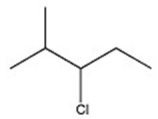
D)
E)
A)

B)

C)

D)

E)


Unlock Deck
Unlock for access to all 228 flashcards in this deck.
Unlock Deck
k this deck
61
Which of the following is the rate law for SN1 mechanisms?
A)Rate = k[Alkyl Halide] [Nucleophile]
B)Rate = k[Nucleophile]
C)Rate = k[Alkyl Halide]
D)Rate = k[Alkyl Halide] [Nucleophile] + k2[Alkyl Halide]
E)Rate = k1[Alkyl Halide] + k2[Nucleophile]
A)Rate = k[Alkyl Halide] [Nucleophile]
B)Rate = k[Nucleophile]
C)Rate = k[Alkyl Halide]
D)Rate = k[Alkyl Halide] [Nucleophile] + k2[Alkyl Halide]
E)Rate = k1[Alkyl Halide] + k2[Nucleophile]

Unlock Deck
Unlock for access to all 228 flashcards in this deck.
Unlock Deck
k this deck
62
Provide the major organic product(s)of the reaction shown. 


Unlock Deck
Unlock for access to all 228 flashcards in this deck.
Unlock Deck
k this deck
63
Which of the following factors has no effect on the rate of SN1 reactions?
A)the nature of the alkyl halide
B)the nature of the leaving group
C)the concentration of the alkyl halide
D)the concentration of the nucleophile
E)the value of the rate constant
A)the nature of the alkyl halide
B)the nature of the leaving group
C)the concentration of the alkyl halide
D)the concentration of the nucleophile
E)the value of the rate constant

Unlock Deck
Unlock for access to all 228 flashcards in this deck.
Unlock Deck
k this deck
64
Provide the structure of the major organic product of the following reaction. 


Unlock Deck
Unlock for access to all 228 flashcards in this deck.
Unlock Deck
k this deck
65
Provide the major organic product(s)in the reaction below. 


Unlock Deck
Unlock for access to all 228 flashcards in this deck.
Unlock Deck
k this deck
66
Provide the major organic products(s)of the reaction shown. 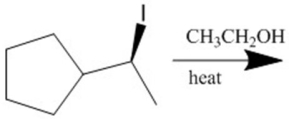


Unlock Deck
Unlock for access to all 228 flashcards in this deck.
Unlock Deck
k this deck
67
Provide the major organic product of the reaction below and a detailed,stepwise mechanism which accounts for its formation. 


Unlock Deck
Unlock for access to all 228 flashcards in this deck.
Unlock Deck
k this deck
68
Which of the following carbocations is the least stable? 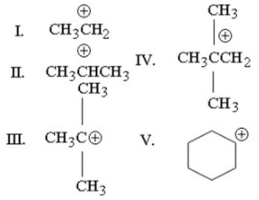
A)I
B)II
C)III
D)IV
E)V

A)I
B)II
C)III
D)IV
E)V

Unlock Deck
Unlock for access to all 228 flashcards in this deck.
Unlock Deck
k this deck
69
Provide the major organic product(s)in the reaction below. 


Unlock Deck
Unlock for access to all 228 flashcards in this deck.
Unlock Deck
k this deck
70
Provide the structure of the major organic products which result in the reaction below. 


Unlock Deck
Unlock for access to all 228 flashcards in this deck.
Unlock Deck
k this deck
71
Which of the compounds below undergoes solvolysis in aqueous ethanol most rapidly?
A)cyclohexyl bromide
B)methyl iodide
C)isopropyl chloride
D)3-chloropentane
E)3-iodo-3-methylpentane
A)cyclohexyl bromide
B)methyl iodide
C)isopropyl chloride
D)3-chloropentane
E)3-iodo-3-methylpentane

Unlock Deck
Unlock for access to all 228 flashcards in this deck.
Unlock Deck
k this deck
72
In the SN1 hydrolysis mechanism of (CH3)3CBr,there are ________ elementary steps,________ distinct transition states,and ________ distinct intermediates.
A)2,2,2
B)2,2,3
C)2,3,2
D)3,2,3
E)3,3,2
A)2,2,2
B)2,2,3
C)2,3,2
D)3,2,3
E)3,3,2

Unlock Deck
Unlock for access to all 228 flashcards in this deck.
Unlock Deck
k this deck
73
The specific rotation of optically pure (R)-sec-butyl alcohol is -13.52°.An optically pure sample of (R)-sec-butyl bromide was converted into the corresponding sec-butyl alcohol via an SN2 reaction.What is the specific rotation of the product,assuming 100% yield?
A)-13.52°
B)between 0° and -13.52°
C)between 0° and +13.52°
D)+13.52°
E)zero
A)-13.52°
B)between 0° and -13.52°
C)between 0° and +13.52°
D)+13.52°
E)zero

Unlock Deck
Unlock for access to all 228 flashcards in this deck.
Unlock Deck
k this deck
74
Which of the following iodides undergoes SN1 solvolysis in water the fastest?
A)1-iodo-3-methylpentane
B)2-iodopentane
C)2-iodo-2-methylpentane
D)3-iodopentane
E)1-iodo-2,2-dimethylpentane
A)1-iodo-3-methylpentane
B)2-iodopentane
C)2-iodo-2-methylpentane
D)3-iodopentane
E)1-iodo-2,2-dimethylpentane

Unlock Deck
Unlock for access to all 228 flashcards in this deck.
Unlock Deck
k this deck
75
Which of the following alkyl halides gives the fastest SN1 reaction?
A)CH3CH2CH2Br
B)
C)
D)CH3CH2CH2I
E)CH3CH2CH2Cl
A)CH3CH2CH2Br
B)

C)

D)CH3CH2CH2I
E)CH3CH2CH2Cl

Unlock Deck
Unlock for access to all 228 flashcards in this deck.
Unlock Deck
k this deck
76
Which of the following alkyl halides gives the fastest SN1 reaction?
A)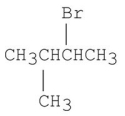
B)
C)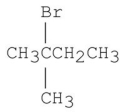
D)
E)
A)

B)

C)

D)

E)


Unlock Deck
Unlock for access to all 228 flashcards in this deck.
Unlock Deck
k this deck
77
When (S)-2-bromobutane undergoes an SN2 reaction with CH3O-,the product is the compound shown below.What is/are the configuration(s)of the product(s)obtained from this reaction? 
A)S only
B)R only
C)a mixture of enantiomers with more R than S
D)a mixture of enantiomers with more S than R
E)equal mixture of R and S

A)S only
B)R only
C)a mixture of enantiomers with more R than S
D)a mixture of enantiomers with more S than R
E)equal mixture of R and S

Unlock Deck
Unlock for access to all 228 flashcards in this deck.
Unlock Deck
k this deck
78
Which of the following carbocations is the most stable?
A)
B)
C)
D)
E)
A)

B)

C)

D)

E)


Unlock Deck
Unlock for access to all 228 flashcards in this deck.
Unlock Deck
k this deck
79
SN1 reactions usually proceed with
A)equal amounts of inversion and retention at the center undergoing substitution.
B)slightly more inversion than retention at the center undergoing substitution.
C)slightly more retention than inversion at the center undergoing substitution.
D)complete inversion at the center undergoing substitution.
E)complete retention at the center undergoing substitution.
A)equal amounts of inversion and retention at the center undergoing substitution.
B)slightly more inversion than retention at the center undergoing substitution.
C)slightly more retention than inversion at the center undergoing substitution.
D)complete inversion at the center undergoing substitution.
E)complete retention at the center undergoing substitution.

Unlock Deck
Unlock for access to all 228 flashcards in this deck.
Unlock Deck
k this deck
80
Provide the major organic products(s)of the reaction shown. 


Unlock Deck
Unlock for access to all 228 flashcards in this deck.
Unlock Deck
k this deck


